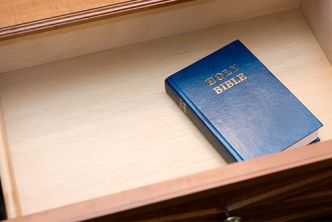 Marriott International recently announced that it would place copies of the Bible and the Book of Mormon in hotel rooms of its newly acquired chains: Westin, Sheraton, and Starwood. Marriott previously requires its properties to have copies of the holy books in the rooms, and now that practice has been extended further to other brands under the Marriott umbrella. Prior to being acquired by Marriott, Starwood Hotels did not have any religious books in its rooms. But should the books be in the room in the first place? Are Bibles in hotel rooms a friendly gesture towards Christian guests, or an outdated tradition?
Marriott International recently announced that it would place copies of the Bible and the Book of Mormon in hotel rooms of its newly acquired chains: Westin, Sheraton, and Starwood. Marriott previously requires its properties to have copies of the holy books in the rooms, and now that practice has been extended further to other brands under the Marriott umbrella. Prior to being acquired by Marriott, Starwood Hotels did not have any religious books in its rooms. But should the books be in the room in the first place? Are Bibles in hotel rooms a friendly gesture towards Christian guests, or an outdated tradition?
How Did the Hotel Room Bible Come to Be?
In 1908, Gideons International began placing free copies of the Bible in hotel rooms. The organization began ten years prior when two traveling salesmen met in a hotel and discussed forming an organization that would turn traveling salesmen into evangelists. They began distributing Bibles to people, but hotels were not targeted until about 10 years after they organized. Today, Gideons International has distributed more than two billion Bibles to hotels, military bases, hospitals, and prisons.
According to the Los Angeles Times, a hospitality analytics company found that the number of U.S. hotels which offer religious material is on the decline. In 2006, about 95 percent of hotels had Bibles and other religious reading in the room. In 2016, that figure was just 48 percent.
Hotels are phasing out the amenity for multiple reasons. Some major franchises leave it up to the owner of the hotel, unlike Marriott, which makes it standard in all of their franchises. Hotels want to avoid offending international travelers who might not be Christian. Younger American travelers (millennials) are not as devout as previous generations. And hotels are no longer installing drawers, using shelves instead. This makes it difficult to discreetly place a Bible in the room.
Another key reason that hotels are phasing out Bibles is due to pressure from atheist groups. In 2015 the Freedom From Religion Foundation sent a letter to 15 of the largest US hotel chains requesting that they remove the Bible from hotel rooms in order to be more accommodating to non-Christian guests. The letter pulled no punches, saying that “bigots, child molesters, rapists, even slaveholders can find bible verses that justify or mandate their crimes”, and that “many of your guests are freethinkers… who are offended to be charged high fees only to be proselytized in the privacy of their own bedrooms”. Does the letter have a point? Hotel guests are some of the most diverse people in the world, wouldn’t it be wise for hotels to consider their business practices in relation to their customers?
Can’t Guests Just Ignore Bibles in the Hotel Room?
It is important to note that Marriott Is a private company, not subject to rules of separation of church and state, and they are free to put whatever religious texts they’d like in their rooms. But practically speaking, hotels don’t really need to include Bibles in their rooms if they offer Wi-Fi. Most people today who travel are digitally connected and can access the Bible through an app or online. At this point, it would seem that Bibles are placed in hotel rooms either due to tradition or as a courtesy to Christian guests, not out of religious necessity.
Looking at it from a business perspective, it would be interesting to know what the actual ROI is on leaving a Bible for hotel guests to use. Are the Gideons spending money providing Bibles that are just collecting dust? Or is the value of hotel room Bibles for Marriott in goodwill with Christians?
Marriott International has its roots in Mormonism, or The Church of Jesus Christ of Latter-day Saints. The LDS Church is widely known for its evangelism and missionary work. It should be no surprise that they choose to provide Bibles in their hotels. That is their right as a private business. However, as the United States populace becomes less religious, and international travel becomes more and more accessible, will the hotel Bible continue to be a cost-effective business decision? Or as society becomes less religious, will it be a practice that fades into obscurity? Only time will tell.
Add Your Comment